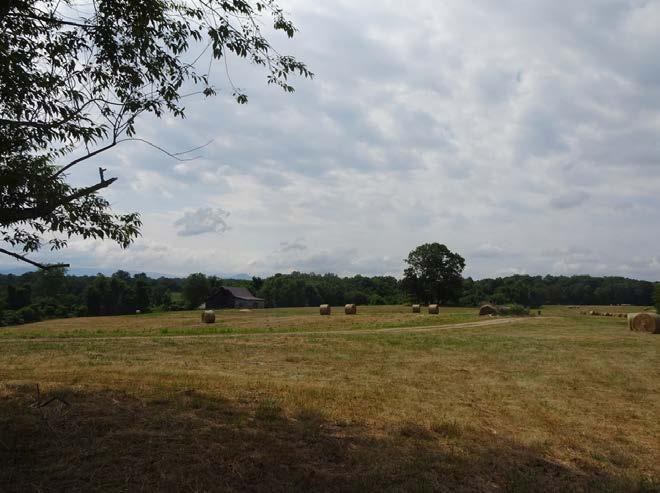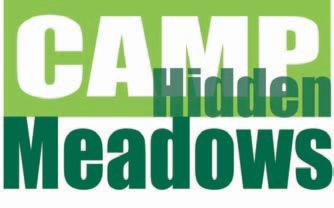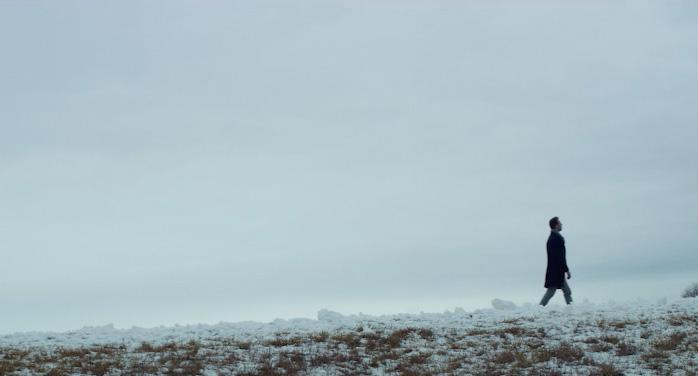
14 minute read
Panorama Farms thinks outside the coffin
Going green
Albemarle farm hopes to open natural burial ground
Advertisement
By Brielle Entzminger
reporter@c-ville.com
In 2009, Dr. Latham Murray of Earlysville passed away at age 59 at his childhood home, Panorama Farms. His family decided to take care of the funeral themselves, building him a homemade coffin and burying him in their family cemetery. Without knowing it, they had given him a natural burial, free of toxic embalming chemicals, exotic wood caskets, concrete burial vaults, and other elements of traditional funerals known to harm the environment.
After performing more natural burials for their parents, Jean and James Murray, the next generation of Murrays now hopes to add a natural burial ground to their Albemarle farm, giving other members of the community the option to say good-bye to their loved ones in a greener way.
“This is a profoundly meaningful way to care for and respect the dead,” says Chris Murray. “This would be a wonderful thing for the community.”
During a green burial, the deceased are typically placed in a simple wicker or woven casket, or covered with cotton shroud or blanket, all of which are biodegradable and allow for natural decomposition. After they are lowered into the ground and buried under several feet of soil, their graves are marked with a flat stone marker or native plants, in lieu of concrete or plastic memorials. Some natural cemeteries even offer organic burial pods, which turn decaying bodies (or ashes) into trees.
“My parents were enthusiastic environmentalists. This is a way to maintain their legacy of environmental stewardship,” adds Murray, whose family has owned Panorama Farms for nearly 70 years.
According to the Green Burial Council, there are currently around 250 green cemeteries in the U.S., including three in Virginia. With the approval of the Albemarle County Board of Supervisors, Panorama Farms could become the first green cemetery in the Charlottesville area.
The 20-acre burial ground would also help raise revenue to sustain and preserve the family farm.
Natural burials have been the norm in Jewish and Muslim communities for thousands of years, and were common in the United States until the Civil War, when wealthy Northerners started paying for their deceased soldiers to be embalmed and shipped home. After he was assassinated in 1865, Abraham Lincoln was embalmed and paraded across the country, leading to the birth of the modern American funeral industry, reports the Smithsonian.
“We’re essentially going back to that principle in Judeo-Christian tradition, which is literally ‘dust to dust,’” explains Murray. “The current conventional funeral and burial practices, the body basically never turns to dust.”
Natural burials cut out dangerous embalming fluid—a known carcinogen. And they’re greener than cremation, which releases nearly 600 pounds of carbon dioxide into the air and can vaporize harmful metals from dental fillings or surgical implants. They also save money, costing an average of $2,000 to $3,000, compared to the average $9,000 traditional American funeral.
According to Murray, the board of supervisors has until March 2022 to rule on the special use permit application, but the family hopes to hear back by late summer.
“We love the idea—but it’s not a slam dunk until we actually get the special use permit,” says Murray.

“I have really put a lot of effort into advertising,
I never thought that advertising in a magazine or newspapers would be so rewarding. I have several people that makes an effort to tell me that they found out about my restaurant through Knife and Fork and the C-VILLE Weekly. I continue to use these magazines to capture new customers.”
~ Angelic Jenkins Owner of Angelics Kitchen

n Dream-pop
TRISTAN WILLIAMS S tray Fossa’s “Commotion” is a warm, upbeat indie jaunt—a glassy melody pings away over an active drum track while far-off vocals give the whole thing a touch of the surreal. The tune clocks in at under three minutes, but that was enough to catch the attention of NYCbased talent scout Matt Salavitch in mid-2018. Salavitch was looking for new and interesting artists to book for Rockwood Music Hall, a Lower East Side independent venue that’s been a beacon for up-andcoming and established artists for more than 15 years. When he heard “Commotion,” Salavitch was immediately struck by its sound.
“It evoked some of that Brooklyn shoegaze dream-pop,” he recalls.
It turned out that the band with the big, shimmery sound was neither big nor from New York, but a trio out of central Virginia. Salavitch booked the group right away, and Stray Fossa joined the ranks of artists like Norah Jones, The Lumineers, and Sting when it took the stage at Rockwood.
Brothers Nick Evans (guitar) and Will Evans (drums), along with their childhood friend Zach Blount (bass) make up the homegrown band, which had been operating as a strictly independent entity: When they played the first Rockwood show, they had no management or label, tackled regional show bookings on their own, and recorded all of their music in a de-facto studio they fashioned in their living room. But after their New York performance, Salavitch was so taken with the group that he offered to lend a hand with management responsibilities.
“The fact that I discovered Stray Fossa and they came to my attention was evidence of what they already had going outside of the Charlottesville scene,” he says.
The group gained traction with a handful of singles and EPs, and there was no doubt that the music resonated with a wider audience. So their new manager encouraged them to record a proper full-length album.
With the space afforded by the pandemic and ensuing quarantine, the trio did just that. Released in early April, With You For Ever is a lush collection of synth-laden pop-rock. And it was a long time coming, to say the least.
The band members grew up in Sewanee, Tennessee, a small mountain town located between Chattanooga and Nashville. Nick and Will were raised in a musical household, where their parents’ record collection consisted of legendary albums by Simon & Garfunkel, David Bowie, and Brian Eno.
“We had this great library where [our dad] would get these concert DVDs, and he would basically give us a running commentary on his musical heroes,” Nick recalls.
In early high school, Nick (who is two years older than Will), picked up his dad’s guitar and began learning how to play. Will followed suit, taking up the drums, and inviting his best friend Zach to try his hand at the bass. Hours spent playing at each other’s houses slowly morphed into gigs around town and at area summer camps. Nick’s friend and classmate, Scott Owsley, would hang around in those days, too—but his instrument of choice was a camera. Now a television editor in New York City, Owsley taught himself how to edit using concert footage that he filmed during Stray Fossa shows in Sewanee, the summer before he and Nick went off to college.
“The town itself has a culture around trying new things and defining your own artistic voice and I think a lot of it for them was figuring out what their voice would be,” Owsley says. “I definitely noticed that they started down that path in high school— not finding the sound itself, but it seemed like at the time they knew that that was the next step for them at a certain point.”
After high school, the musicians took a step back from Stray Fossa to follow their own paths. Nick attended Davidson College in North Carolina and, after graduating, moved to Berlin to do environmental advocacy work. Zach also graduated from Davidson, and returned to Sewanee to conduct psychological research. Will came to Charlottesville to attend the University of Virginia, and continued to build on a political ecology research project in Belize that he completed for his undergraduate thesis. Academic interests aside, they remained committed to playing music together, and all three moved to Charlottesville in 2017 to pick up where they’d left off—in search of their voice.
“We very much had to reinvent the wheel and learn how to play live together again,” says Zach. “Part of that was trying to figure out how to fill a room with only three people in a way that we were satisfied with. There’s tons of power trios out there—drums, bass, and guitar—and we always have a desire to produce
TRISTAN WILLIAMS

Stray Fossa’s Nick Evans says Charlottesville’s robust live music scene was a major reason the band settled here in 2017. more sound than what typically would be created by those three instruments.”
They rented a house together and now record out of a homemade studio in their attic. Nick experimented with guitar pedals; once he settled into a sound the rest of the band took it from there. Will spearheads engineering and production, and his detail-oriented work style involves layering and looping with a precision that allows the group to extend its music beyond the confines of a three-piece, creating the richness they had been searching for.
“I think we’re all very open to genre; we’re all open enough that in two years, we could have a very different sound,” Will says. “[A] big factor that influences our sound is the stuff that we’ve collected over the years. We still use the analog-todigital converter boxes that we had when we were kids. We actually got so glued to it that we bought two; we had to go on eBay because no company still sells these things.”
While Stray Fossa could have chosen to settle closer to home in Nashville, the central Virginia music scene felt like the right fit.
“It was important to be in a place that really appreciates music, and a place where we felt we could actually jump in and get going,” Nick explains. “Charlottesville’s lent itself to that in a huge way, just because of how important the live music scene is, and how welcoming and gracious we’ve found it to be.”
With its strong network of community venues, central Virginia was a great training ground for booking shows. The group traveled from Blacksburg to Richmond to Harrisonburg and even to D.C. Will and Nick took jobs at the Southern and Zach started handling lights at the Jefferson, strengthening the group’s ties in town.
House shows, they found, were also a great way to connect with other bands. They recall nights playing Charlottesville’s Magnolia House with area acts Gold Connections and Minor Poet, and it was at a house show in Harrisonburg where they first met the duo Illiterate Light, a band rising quickly on the national scene. After shows, Stray Fossa would ask Illiterate Light’s Jeff Gorman and Jake Cochran for feedback on the performance.
“They reminded me of me and Jeff when we started out,” says Cochran. “They’d ask us to tell them directly what worked and what didn’t work. It was very serious and they were very dedicated from the get-go.”
Both drummers and producers, Cochran and Will established a kinship that remains. Will sent Cochran early mixes of the tracks that make up With You For Ever.
“When I first heard [the finished album] I took a step back,” says Cochran. “This isn’t just a Charlottesville band; this isn’t just my friends’ band anymore. ...The work that they did...took it from a cool, local, regional band to the next band that the world is waiting to discover.”

The LongLasting Benefits of Camp
AMERICAN CAMP ASSOCIATION


Camp has become a part of the fabric of America — conjuring special memories of hiking, swimming, friendships, and adventure for generations. When children go to camp, they’ll likely come home gushing about the lifelong friends they’ve made, and the exciting adventures they had. What they probably won’t tell you about are the life lessons camp has given them — those skills that, if nurtured at home after camp, translate into a lasting self-confidence, an awareness of the importance of kindness, and a greater comfort in voicing their opinions.
For more than 150 years, camp has been changing lives — allowing all children to feel successful, especially those who may struggle with traditional educational settings. Camp is full of fun and excitement, but it is so much more — developing children who are better equipped to lead in the twenty-first century with skills such as independence, empathy, the ability to work as part of a team, and a broader world view. • Camp is a safe and nurturing environment that enhances social skills. Camp is for everyone, so children and youth have the opportunity to meet and interact with peers from outside their school environment. • Camp supplements traditional education. Camps use intentional programming to create a balance of experiential learning opportunities that are physical, emotional, and social. • Camp provides experiences that promote self-confidence and future academic growth.
American Camp Association® (ACA) independent research shows that parents and camp staff, as well as the campers themselves, report significant growth in several areas, including leadership, independence, social comfort, and values and decisions. • Camp encourages a respect and love of nature. Children are able to learn about the natural world. Camp also gives them a chance to “unplug.” More and more experts are advocating the value of time spent in nature for children — and camp is a perfect place to do that. • Camp provides the opportunity to stay physically active. Camp is the ultimate outdoor experience with programs that offer physical activities and sports that enhance health and teach self-confidence.
Camp is a natural extension of the classroom. Research indicates that by participating in strategically planned, structured summer experiences, children reduce summer learning loss. Camp challenges children, keeps them engaged, develops creativity and their talents, and expands their horizons. Reprinted by permission of the American Camp Association. ©2021 American Camping Association, Inc.
About American Camp Association
The American Camp Association® (ACA) is a national organization with more than 12,000 individual members and 3,100 member camps. ACA is committed to collaborating with those who believe in quality camp and outdoor experiences for children, youth, and adults. ACA provides advocacy, evidencebased education, and professional development, and is the only independent national accrediting body for the organized camp experience. ACA accredits more than 2,400 diverse US camps. ACA Accreditation provides public evidence of a camp's voluntary commitment to the health, safety, risk management, and overall well-being of campers and staff. For more information, visit ACAcamps. org or call 800-428-2267.

Overnight Summer Camps Boys & Girls Ages 6-16 1 to 4 Week Sessions


Horses, Sports White Water Rafting Heated pool Mtn. boarding, Canoeing, Backpacking, Organic Farm Mtn. Biking, Rock Climbing 1,000 Foot Zip Line Arts, & More! Only 2 hours west of Charlottesville 800-600-4752
camphiddenmeadows.com
Voted Favorite Camp by C’ville Area Families
”

STEM SUMMER CAMP
june 14-18 rising 5-6th graders
june 21-25 rising 7-8th graders
ROBOTS! CIRCUITS! ROCKETS! PLUS DAILY EXERCISE & NUTRITIONshieldslab.com/camp register online!



THROUGH 5/15
BREAK OUT
Part visual album, part queer drama, and part live experience, The Wandering is a new way of experiencing theatrical art. Created by Charlottesville native and Albemarle High School alum Jeremy Weiss, the production is inspired by the music of Franz Schubert, and uses a queer lens to examine the love and pain that divided the composer, while reshaping how classical music can be presented. The audience is transported through the use of augmented reality, outdoor excursions, and online interactions in each of the event’s four episodes. Buy a ticket, receive your package in the mail, and log in to begin the journey. $24.99-29.99, on demand. experiencethe wandering.com.
WEDNESDAY 5/5
HOT CHOCOLATE
Food nourishes the magical realism in the 1992 international sensation Like Water For Chocolate. When Tita is forbidden from marrying her true love Pedro due to her place in the family lineage, he marries her older sister. Tita becomes a cook, and channels her undying passion for her brother-in-law into meals with special powers, including one in which a rose petal sauce induces a lustful frenzy. The titillating film winds through themes of gender and tradition while composing a fantastical recipe for the power of love. $6.50-8. 3 and 7pm. The Paramount Theater, 215 E. Main St., Downtown Mall. theparamount.net.
MIRAMAX

OUR GUIDE TO YOUR WEEK
COURTESY OF THE ARTIST

“Shenandoah Forest” by Amy Shawley Paquette
SATURDAY 5/8
MOM GENES
Did Mother’s Day sneak up on you like a helicopter parent? Instead of searching for a lastminute gift, take mom to Craft Cville’s third annual outdoor Mother’s Day Market, where she can choose from an array of goods from local artisans and vintage curators. Savor a piece of cake from Sliced while perusing new spins from Styx and Stones vinyl, landscape paintings from Amy Shawley Paquette, and zero-waste cloth wraps from Suzu Living, among the more than 40 vendors lining the walkways at Stonefield. Free, 11am. The Shops at Stonefield, craft-cville.com.





